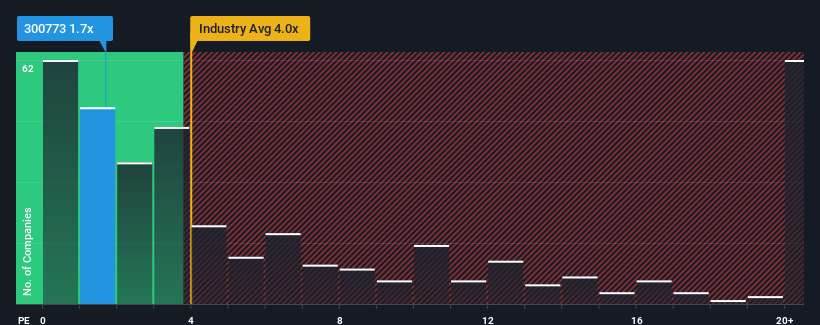- China
- /
- Diversified Financial
- /
- SZSE:300773
Investors Aren't Entirely Convinced By Lakala Payment Co., Ltd.'s (SZSE:300773) Revenues

With a median price-to-sales (or "P/S") ratio of close to 1.7x in the Diversified Financial industry in China, you could be forgiven for feeling indifferent about Lakala Payment Co., Ltd.'s (SZSE:300773) P/S ratio, which comes in at about the same. Although, it's not wise to simply ignore the P/S without explanation as investors may be disregarding a distinct opportunity or a costly mistake.
Check out our latest analysis for Lakala Payment

What Does Lakala Payment's P/S Mean For Shareholders?
Recent times have been pleasing for Lakala Payment as its revenue has risen in spite of the industry's average revenue going into reverse. It might be that many expect the strong revenue performance to deteriorate like the rest, which has kept the P/S ratio from rising. Those who are bullish on Lakala Payment will be hoping that this isn't the case, so that they can pick up the stock at a slightly lower valuation.
If you'd like to see what analysts are forecasting going forward, you should check out our free report on Lakala Payment.What Are Revenue Growth Metrics Telling Us About The P/S?
Lakala Payment's P/S ratio would be typical for a company that's only expected to deliver moderate growth, and importantly, perform in line with the industry.
Retrospectively, the last year delivered a decent 11% gain to the company's revenues. However, this wasn't enough as the latest three year period has seen an unpleasant 3.0% overall drop in revenue. So unfortunately, we have to acknowledge that the company has not done a great job of growing revenue over that time.
Turning to the outlook, the next year should generate growth of 12% as estimated by the six analysts watching the company. That's shaping up to be materially higher than the 5.7% growth forecast for the broader industry.
With this information, we find it interesting that Lakala Payment is trading at a fairly similar P/S compared to the industry. Apparently some shareholders are skeptical of the forecasts and have been accepting lower selling prices.
What We Can Learn From Lakala Payment's P/S?
While the price-to-sales ratio shouldn't be the defining factor in whether you buy a stock or not, it's quite a capable barometer of revenue expectations.
We've established that Lakala Payment currently trades on a lower than expected P/S since its forecasted revenue growth is higher than the wider industry. There could be some risks that the market is pricing in, which is preventing the P/S ratio from matching the positive outlook. At least the risk of a price drop looks to be subdued, but investors seem to think future revenue could see some volatility.
It is also worth noting that we have found 2 warning signs for Lakala Payment (1 is a bit concerning!) that you need to take into consideration.
If companies with solid past earnings growth is up your alley, you may wish to see this free collection of other companies with strong earnings growth and low P/E ratios.
New: AI Stock Screener & Alerts
Our new AI Stock Screener scans the market every day to uncover opportunities.
• Dividend Powerhouses (3%+ Yield)
• Undervalued Small Caps with Insider Buying
• High growth Tech and AI Companies
Or build your own from over 50 metrics.
Have feedback on this article? Concerned about the content? Get in touch with us directly. Alternatively, email editorial-team (at) simplywallst.com.
This article by Simply Wall St is general in nature. We provide commentary based on historical data and analyst forecasts only using an unbiased methodology and our articles are not intended to be financial advice. It does not constitute a recommendation to buy or sell any stock, and does not take account of your objectives, or your financial situation. We aim to bring you long-term focused analysis driven by fundamental data. Note that our analysis may not factor in the latest price-sensitive company announcements or qualitative material. Simply Wall St has no position in any stocks mentioned.
Have feedback on this article? Concerned about the content? Get in touch with us directly. Alternatively, email editorial-team@simplywallst.com
About SZSE:300773
Lakala Payment
Provides third-party payment and cross-border payment services in China.
Adequate balance sheet second-rate dividend payer.
Market Insights
Community Narratives


